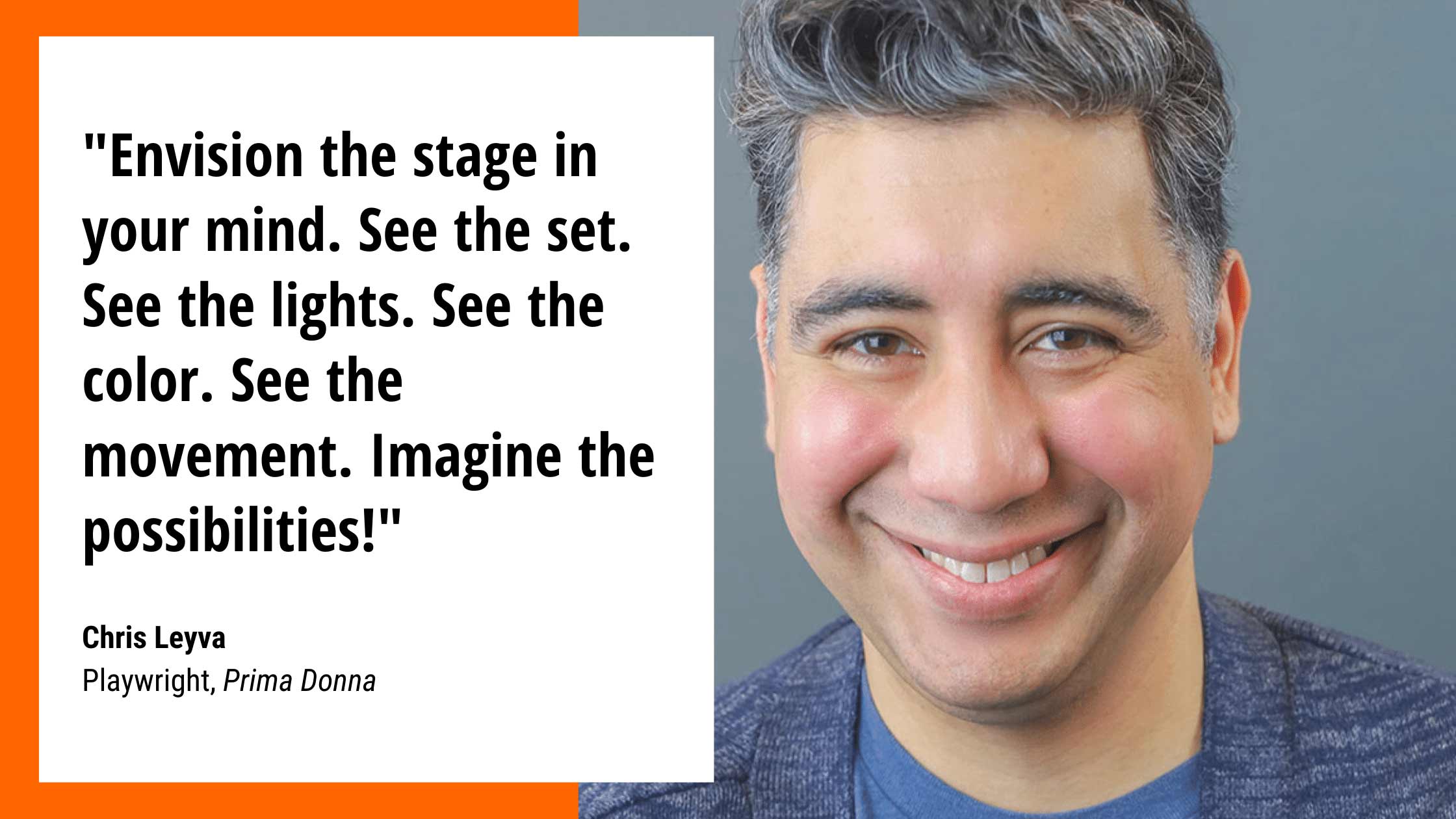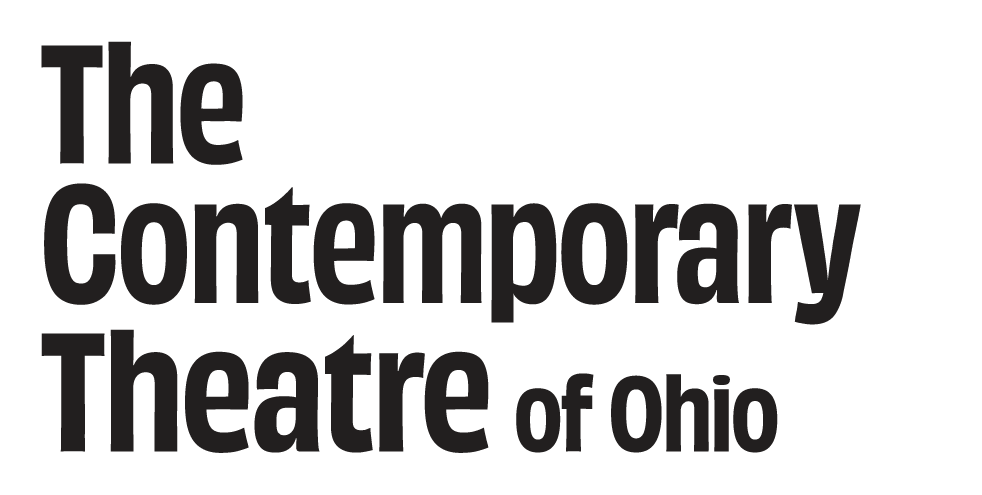Playwright Prospective: Chris Leyva’s reading in the New Works Festival
January 28, 2021

Chris’ play Prima Donna is being read as part of our New Works Festival on Saturday, February 6, at 7 pm. Details on his reading and how to attend can be found here.
Chris Leyva writes and directs plays and is a frequent collaborator with CATCO, CLIMB Theatre, and Hixon Dance. Chris also works in graphic design and video editing. He received an MFA from the Playwrights Workshop at The University of Iowa, a BA in directing from Coe College, and is a member of the Dramatists Guild.
Tell us about your creative process. What was the inspiration behind your play for the New Works Festival?
“Prima Donna started from a conversation with Joe Bishara, the former Assistant Producing Director at CATCO. He floated the idea of writing something that told a story from a female character’s point of view, such as telling the story of Othello from Desdemona’s side. He also mentioned Irene Adler. Because I’m a fan of Sherlock Holmes adaptations (especially The Great Mouse Detective!), I really wanted a chance to see what I could do with her story.
Irene Adler is interesting because, even though she only appears in one short story, she holds great mystique as being ‘the woman who outsmarted Sherlock Holmes.’ In A Scandal in Bohemia, we learn very little about her past or her motives. We only get to hear from her through one line of dialogue and a letter at the end. Everything we know is secondhand information from men. So, I had a lot of questions to answer, including what skills does she have? What is she good at? Where did she learn what she needed to learn? And, most importantly, ‘who is Irene Adler really?’ That is the question that activates the entire play.”
What role, play, or production are you most proud of?
“The great thing about theatre is that every experience offers a chance to learn and grow as a person and artist. But there are some magical moments where an idea lands exactly right or better than you imagined. For me, I’m most proud of my production of Cowgirls Don’t Ride Zebras that premiered at CATCO a few years ago. I specifically wrote “Cowgirls” for my son, Jack, who was 4 at the time. I wanted to give him a theatrical experience full of things he loved: music, dancing, animals, physical comedy, and even dinosaurs. Writing that play reminded me to play, to have fun, to lighten up, and to let my imagination run wild! The audience response to the play was overwhelming, and Jack went to see it about 4 or 5 times!”
What’s the best advice you’ve been given about being a playwright?
“The playwright Sherry Kramer had a massive influence on me and the way I think about writing plays. She taught me that the magic of plays happens in the mind of the audience, not on the stage. She taught me to carefully consider how the mysteries of a play unravel and how the ending of a play should feel completely inevitable. Oh, and she made it very clear that ‘entertainment’ isn’t a bad word.”
What advice would you give to an aspiring playwright?
“If you want to be a playwright, my advice is to make sure you don’t live and breathe only theatre. Keep yourself open to what’s going on in the world, what ideas are flowing. Learn a different art form. Read poetry. Listen to music. See dance. Have deep conversations with friends. Listen to people. Ask big questions and don’t worry about the answers. Also, remember the things you love and use them. For example, I deeply love animation and Disney movies, and whenever I allow that love to inform my plays, my plays become richer and more ‘me.'”
Do you have any plans to write other plays?
“I do have plans to write more plays! I continually have a list of ‘Possible Projects’ that gets longer and longer. There are three plays that are currently at the top of the list and swirling in my mind and heart. I’m asking big questions about what gets passed on to the next generation and what good can come from dark times. Those are serious questions, but imagine them as entertaining, tongue-in-cheek comedies! As long as there are big questions left unanswered, there will be more plays for me to write.”
What’s something that you want everyone to know about your play before the virtual reading?
“Readings of plays can be strange, even when they’re not virtual, because plays are a visual medium. So much of character and story and theme is expressed not just by what is said, but through action on the stage. If you’re joining us for any of the virtual readings during the CATCO New Works Festival, I invite you to bring your imaginations! Envision the stage in your mind. See the set. See the lights. See the color. See the movement. Imagine the possibilities! And, most importantly, I invite you to come to the show with curiosity and questions! Also, be ready to laugh and to be entertained!”
Tell us about your creative process. What was the inspiration behind your play for the New Works Festival?
“Prima Donna started from a conversation with Joe Bishara, the former Assistant Producing Director at CATCO. He floated the idea of writing something that told a story from a female character’s point of view, such as telling the story of Othello from Desdemona’s side. He also mentioned Irene Adler. Because I’m a fan of Sherlock Holmes adaptations (especially The Great Mouse Detective!), I really wanted a chance to see what I could do with her story.
Irene Adler is interesting because, even though she only appears in one short story, she holds great mystique as being ‘the woman who outsmarted Sherlock Holmes.’ In A Scandal in Bohemia, we learn very little about her past or her motives. We only get to hear from her through one line of dialogue and a letter at the end. Everything we know is secondhand information from men. So, I had a lot of questions to answer, including what skills does she have? What is she good at? Where did she learn what she needed to learn? And, most importantly, ‘who is Irene Adler really?’ That is the question that activates the entire play.”
What role, play, or production are you most proud of?
“The great thing about theatre is that every experience offers a chance to learn and grow as a person and artist. But there are some magical moments where an idea lands exactly right or better than you imagined. For me, I’m most proud of my production of Cowgirls Don’t Ride Zebras that premiered at CATCO a few years ago. I specifically wrote “Cowgirls” for my son, Jack, who was 4 at the time. I wanted to give him a theatrical experience full of things he loved: music, dancing, animals, physical comedy, and even dinosaurs. Writing that play reminded me to play, to have fun, to lighten up, and to let my imagination run wild! The audience response to the play was overwhelming, and Jack went to see it about 4 or 5 times!”
What’s the best advice you’ve been given about being a playwright?
“The playwright Sherry Kramer had a massive influence on me and the way I think about writing plays. She taught me that the magic of plays happens in the mind of the audience, not on the stage. She taught me to carefully consider how the mysteries of a play unravel and how the ending of a play should feel completely inevitable. Oh, and she made it very clear that ‘entertainment’ isn’t a bad word.”
What advice would you give to an aspiring playwright?
“If you want to be a playwright, my advice is to make sure you don’t live and breathe only theatre. Keep yourself open to what’s going on in the world, what ideas are flowing. Learn a different art form. Read poetry. Listen to music. See dance. Have deep conversations with friends. Listen to people. Ask big questions and don’t worry about the answers. Also, remember the things you love and use them. For example, I deeply love animation and Disney movies, and whenever I allow that love to inform my plays, my plays become richer and more ‘me.'”
Do you have any plans to write other plays?
“I do have plans to write more plays! I continually have a list of ‘Possible Projects’ that gets longer and longer. There are three plays that are currently at the top of the list and swirling in my mind and heart. I’m asking big questions about what gets passed on to the next generation and what good can come from dark times. Those are serious questions, but imagine them as entertaining, tongue-in-cheek comedies! As long as there are big questions left unanswered, there will be more plays for me to write.”
What’s something that you want everyone to know about your play before the virtual reading?
“Readings of plays can be strange, even when they’re not virtual, because plays are a visual medium. So much of character and story and theme is expressed not just by what is said, but through action on the stage. If you’re joining us for any of the virtual readings during the CATCO New Works Festival, I invite you to bring your imaginations! Envision the stage in your mind. See the set. See the lights. See the color. See the movement. Imagine the possibilities! And, most importantly, I invite you to come to the show with curiosity and questions! Also, be ready to laugh and to be entertained!”





